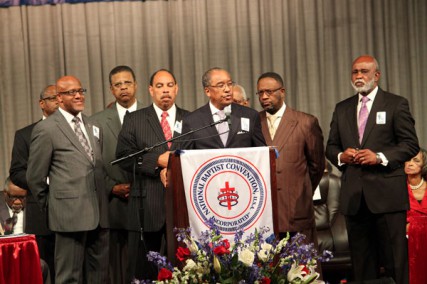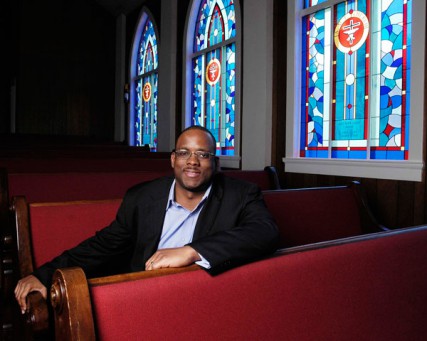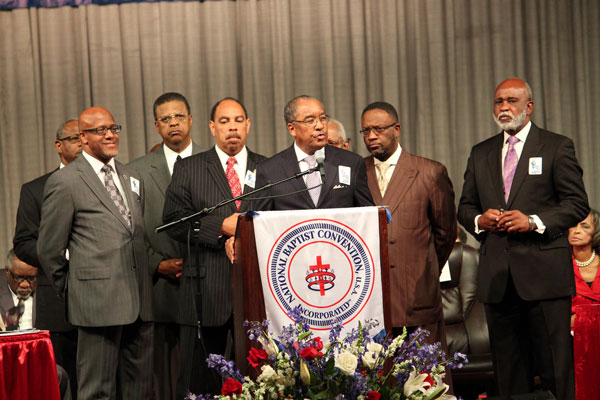(RNS) African-American clergy are joining forces with civil rights groups to push for increased voter registration ahead of the November election, spurred on by new voter laws they say restrict opportunities for minorities to enter the voting booth.
âÂ?Â?We must vote because we must counteract the corrupt and diabolical strategies of those who are trying to take away our vote by passing laws to suppress and diminish our voting rights,âÂ? said the Rev. Julius Scruggs, president of the National Baptist Convention, USA, at a news conference Wednesday (Sept. 5) during his denominationâÂ?Â?s Annual Session in Atlanta.
Scruggs, leaders of the NAACP and top officials of four other black Baptist groups gathered to rally against the new laws and continue longtime efforts to get blacks registered to vote.
The voting laws âÂ?Â? through which some states have reduced early voting or required government-issued identification to enter the polls âÂ?Â? have changed some of the voter education initiatives.
On Thursday, the Rev. Al SharptonâÂ?Â?s National Action Network scheduled a luncheon during the Democratic National Convention to declare a âÂ?Â?state of emergency over voter suppressionâÂ? and call for black pastors to spend the next 30 days helping people get IDs so turnout by black and Latino voters âÂ?Â?is not compromised.âÂ?Â
âÂ?Â?We are targeting congregations across the country to let them know where the laws have been changed so they are not surprised,âÂ? said the Rev. W. Franklyn Richardson, chairman of NAN and of the Conference of National Black Churches.
His church network was addressed by Attorney General Eric Holder at a May meeting in Washington that focused on the new laws.
The Rev. Jamal-Harrison Bryant, pastor of Empowerment Temple in Baltimore, started the Empowerment Movement, a national network of African-American clergy that aimed to register 1 million voters since Easter Sunday. Bryant said the initiative — initially to have each black church register 20 people that day — registered 100,000 on Easter and now has a total of 420,000 registered. But Bryant, who attended the Atlanta rally, had not given up on the million-vote milestone.
âÂ?Â?IâÂ?Â?m here at a Baptist convention as an AME,âÂ? the African Methodist Episcopal pastor said. âÂ?Â?IâÂ?Â?m trying to find 1 million black people. They can be COGIC (Church of God in Christ), Pentecostal, United Methodist. It doesnâÂ?Â?t matter.âÂ?Â
The NAACP estimates that 6 million African-Americans are eligible to vote but are not registered. In a new initiative, 34 churches have worked with the civil rights group to compare their membership rolls with local voter registration lists.
With memories of their forebearsâÂ?Â? living with poll taxes and marching for the Voting Rights Act, many clergy are fighting the laws on two fronts: with get-out-the-vote initiatives and supporting petitions in courts to overturn them.
From the Morehouse College chapel helping register 300 students at a block party to churches preparing caravans to the polls, black religious leaders are hoping to get people to vote regardless of the new laws.
âÂ?Â?There is a suppression law thatâÂ?Â?s under attack, thatâÂ?Â?s in the federal courts, but we arenâÂ?Â?t waiting on that final decision,âÂ? said the Rev. Ralph Canty, interim general secretary of the Progressive National Baptist Convention and a pastor in South Carolina.
âÂ?Â?Many of us are doing all that we can to help people get ID. ItâÂ?Â?s difficult for older people. ItâÂ?Â?s requiring a whole lot of extra effort.âÂ?Â?âÂ?Â?
In states that continue to have early voting that includes a Sunday, plans are underway to help churchgoers get there — right after service. The Rev. Greg Moss, president of the Lott Cary Foreign Mission Convention and a Charlotte, N.C., pastor, will lead members of his congregation to the polls.
âÂ?Â?I ride a motorcycle and lead a caravan of people,âÂ? he said.
A federal court recently ruling that TexasâÂ?Â? voter ID law would have a âÂ?Â?retrogressiveâÂ? effect on the poor and racial minorities. Texas Attorney General Gregg Abbott said he would appeal it to the Supreme Court because it provides âÂ?Â?ballot integrity safeguardsâÂ?Â?âÂ?Â? approved in other states.
The Rev. Frederick D. Haynes III, a NAACP religious affairs committee member and Texas pastor, said clergy in his state are collecting signatures to oppose an appeal.
âÂ?Â?We want him to know thereâÂ?Â?s a voice evidently heâÂ?Â?s not listening to,âÂ? said Haynes.
Will any of these efforts make a difference?
Eric McDaniel, associate professor of government at the University of Texas at Austin, said people are more likely to vote if they have a reason, whether itâÂ?Â?s excitement about voting for Barack Obama as the first black president in 2008, or fear that voting rights are being restricted.
âÂ?Â?If you can say, `You may not like Obama but some people are trying to take away your vote,âÂ?Â? that changes things significantly,âÂ? said McDaniel, author of a book on black churches and political mobilization. âÂ?Â?That provides them with more ammunition to get them out to the polls.âÂ?Â
END BANKS
(RNS) African-American clergy are joining forces with civil rights groups to push for increased voter registration ahead of the November election, spurred on by new voter laws they say restrict opportunities for minorities to enter the voting booth.

Rev. Julius Scruggs (center), president of the National Baptist Convention, USA, is surrounded by other Baptist leaders and NAACP officials on Wednesday Sept. 5 in Atlanta.
“We must vote because we must counteract the corrupt and diabolical strategies of those who are trying to take away our vote by passing laws to suppress and diminish our voting rights,” said the Rev. Julius Scruggs, president of the National Baptist Convention, USA, at a news conference Wednesday (Sept. 5) during his denomination’s Annual Session in Atlanta.
Scruggs, leaders of the National Association for the Advancement of Colored People and top officials of four other black Baptist groups gathered to rally against the new laws and continue longtime efforts to get blacks registered to vote.
More than two dozen new voter laws have passed in 19 states since 2011, according to the Brennan Center for Justice at New York University School of Law. Some have been overturned but others remain on the books, such as a voter ID law in New Hampshire and proof of citizenship requirements in Alabama, Kansas and Tennessee. Proponents say they prevent fraud, while opponents say they are reducing access to the polling booth.
The voting laws – through which some states have reduced early voting or required government-issued identification to enter the polls – have changed some of the clergy's voter education initiatives.
On Thursday, the Rev. Al Sharpton’s National Action Network scheduled a luncheon during the Democratic National Convention to declare a “state of emergency over voter suppression” and call for black pastors to spend the next 30 days helping people get IDs so turnout by black and Latino voters “is not compromised.”
“We are targeting congregations across the country to let them know where the laws have been changed so they are not surprised,” said the Rev. W. Franklyn Richardson, chairman of NAN and of the Conference of National Black Churches.
His church network was addressed by Attorney General Eric Holder at a May meeting in Washington that focused on the new laws.
The Rev. Jamal-Harrison Bryant, pastor of Empowerment Temple in Baltimore, started the Empowerment Movement, a national network of African-American clergy that aimed to register 1 million voters starting Easter Sunday. Bryant said the initiative — initially to have each black church register 20 people that day — registered 100,000 on Easter and now has a total of 420,000 registered. But Bryant, who attended the Atlanta rally, had not given up on the million-voter milestone.
“I’m here at a Baptist convention as an AME,” the African Methodist Episcopal pastor said. “I’m trying to find 1 million black people. They can be COGIC (Church of God in Christ), Pentecostal, United Methodist. It doesn’t matter.”
The NAACP estimates that 6 million African-Americans are eligible to vote but are not registered. In a new initiative, 34 churches have worked with the civil rights group to compare their membership rolls with local voter registration lists.
With memories of their forebears’ living with poll taxes and marching for the Voting Rights Act, many clergy are fighting the laws on two fronts: with get-out-the-vote initiatives and by supporting petitions in courts to overturn the laws.
From the Morehouse College chapel helping register 300 students at a block party to churches preparing caravans to the polls, black religious leaders are hoping to get people to vote regardless of the new laws.
“There is a suppression law that’s under attack, that’s in the federal courts, but we aren’t waiting on that final decision,” said the Rev. Ralph Canty, interim general secretary of the Progressive National Baptist Convention and a pastor in South Carolina.
“Many of us are doing all that we can to help people get ID. It’s difficult for older people. It’s requiring a whole lot of extra effort.’’
In states that continue to have early voting that includes a Sunday, plans are underway to help churchgoers get there — right after service.
The Rev. Greg Moss, president of the Lott Cary Foreign Mission Convention and a Charlotte, N.C., pastor, will lead members of his congregation to the polls. “I ride a motorcycle and lead a caravan of people,” he said.
A federal court recently ruled that Texas’ voter ID law would have a “retrogressive” effect on the poor and racial minorities. Texas Attorney General Greg Abbott said he would appeal the decision to the Supreme Court because the law provides “ballot integrity safeguards’’ approved in other states.
The Rev. Frederick D. Haynes III, a NAACP religious affairs committee member and Texas pastor, said clergy in his state are collecting signatures to oppose an appeal.
“We want him to know there’s a voice evidently he’s not listening to,” said Haynes.

Eric McDaniel, associate professor of government at the University of Texas at Austin, said people are more likely to vote if they have a reason, whether it’s excitement about voting for Barack Obama as the first black president in 2008, or fear that voting rights are being restricted.
Eric McDaniel, associate professor of government at the University of Texas at Austin, said people are more likely to vote if they have a reason, whether it’s excitement about voting for Barack Obama as the first black president in 2008, or fear that voting rights are being restricted.
“If you can say, `You may not like Obama but some people are trying to take away your vote,’ that changes things significantly,” said McDaniel, author of a book on black churches and political mobilization. “That provides them with more ammunition to get them out to the polls.”





